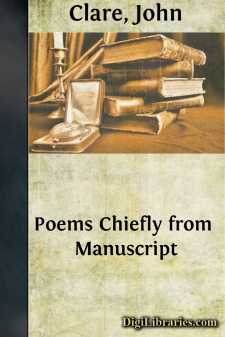Categories
- Antiques & Collectibles 13
- Architecture 36
- Art 48
- Bibles 22
- Biography & Autobiography 813
- Body, Mind & Spirit 142
- Business & Economics 28
- Children's Books 16
- Children's Fiction 13
- Computers 4
- Cooking 94
- Crafts & Hobbies 4
- Drama 346
- Education 46
- Family & Relationships 57
- Fiction 11829
- Games 19
- Gardening 17
- Health & Fitness 34
- History 1377
- House & Home 1
- Humor 147
- Juvenile Fiction 1873
- Juvenile Nonfiction 202
- Language Arts & Disciplines 88
- Law 16
- Literary Collections 686
- Literary Criticism 179
- Mathematics 13
- Medical 41
- Music 40
- Nature 179
- Non-Classifiable 1768
- Performing Arts 7
- Periodicals 1453
- Philosophy 64
- Photography 2
- Poetry 896
- Political Science 203
- Psychology 42
- Reference 154
- Religion 513
- Science 126
- Self-Help 84
- Social Science 81
- Sports & Recreation 34
- Study Aids 3
- Technology & Engineering 59
- Transportation 23
- Travel 463
- True Crime 29
Poems Chiefly from Manuscript
by: John Clare
Description:
Excerpt
BIOGRAPHICAL
The life of John Clare, offering as it does so much opportunity for sensational contrast and unbridled distortion, became at one time (like the tragedy of Chatterton) a favourite with the quillmen. Even his serious biographers have made excessive use of light and darkness, poetry and poverty, genius and stupidity: that there should be some uncertainty about dates and incidents is no great matter, but that misrepresentations of character or of habit should be made is the fault of shallow research or worse. We have been informed, for instance, that drink was a main factor in Clare's mental collapse; that Clare "pottered in the fields feebly"; that on his income of "£45 a year … Clare thought he could live without working"; and all biographers have tallied in the melodramatic legend; "Neither wife nor children ever came to see him, except the youngest son, who came once," during his Asylum days. To these attractive exaggerations there are the best of grounds for giving the lie.
John Clare was born on the 13th of July, 1793, in a small cottage degraded in popular tradition to a mud hut of the parish of Helpston, between Peterborough and Stamford. This cottage is standing to-day, almost as it was when Clare lived there; so that those who care to do so may examine Martin's description of "a narrow wretched hut, more like a prison than a human dwelling," in face of the facts. Clare's father, a labourer named Parker Clare, was a man with his wits about him, whether educated or not; and Ann his wife is recorded to have been a woman of much natural ability and precise habits, who thought the world of her son John. Of the other children, little is known but that there were two who died young and one girl who was alive in 1824. Clare himself wrote a sonnet in the London Magazine for June, 1821, "To a Twin Sister, Who Died in Infancy."
Parker Clare, a man with some reputation as a wrestler and chosen for thrashing corn on account of his strength, sometimes shared the fate of almost all farm labourers of his day and was compelled to accept parish relief: at no time can he have been many shillings to the good: but it was his determination to have John educated to the best of his power. John Clare therefore attended a dame-school until he was seven; thence, he is believed to have gone to a day-school, where he made progress enough to receive on leaving the warm praise of the schoolmaster, and the advice to continue at a nightschool—which he did. His aim, he notes later on, was to write copperplate: but there are evidences that he learned much more than penmanship. Out of school he appears to have been a happy, imaginative child: as alert for mild mischief as the rest of the village boys, but with something solitary and romantic in his disposition. One day indeed at a very early age he went off to find the horizon; and a little later while he tended sheep and cows in his holiday-time on Helpston Common, he made friends with a curious old lady called Granny Bains, who taught him old songs and ballads....


